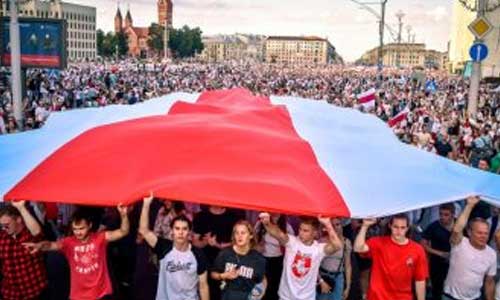Belarusian university students marked the start of the academic year on September 1 by announcing a strike. They planned to gather in Victory Square and then march to the Ministry of Education, where they would present a petition criticizing the authorities’ actions in the weeks since last month’s fraudulent presidential election. But almost immediately upon reaching the square, they encountered the riot police (OMON).
Unlike in other recent protests, the authorities showed little restraint in arresting demonstrators. But news of the harsh response spread quickly, prompting more students to take to the streets. As the ranks of university and even some high-school students swelled, what was supposed to be an hour-long demonstration continued for the rest of the day. At one point, a procession of some 200 students with flags passed by Mickiewicz Square. It was followed by another procession, this one comprising several dozen OMON.
Soon, the authorities decided that it was time to intervene, and undercover policemen suddenly started rounding up students. These plainclothes officers are the most despised of the security forces, because they are widely seen as cowards. At least the OMON and other uniformed officers are willing to come face to face with the protesters, unlike those who hide in their cars, waiting for an opportune moment to snatch people off the streets.
To be sure, neither the regular police nor the OMON ever reveal their full faces, and when one loses his balaclava, he tends to be overcome by fear. Those who are photographed are quickly identified and logged on the “Black Book of Belarus” Telegram channel. These acts of unmasking are effective precisely because the opposition enjoys such widespread public support. Members of the security forces have every reason to fear social ostracism, as do the judges, prosecutors, and others complicit in the repression. Unfortunately, the judiciary remains completely subordinate to the regime.
At 6 p.m. the same day, students started gathering in Independence Square, where men in black quickly surrounded them. In what has now become a typical scene, police vans with loudspeakers barked warnings and blared Soviet-era songs in an effort to drown out the demonstrators’ chants.
By 8 p.m., about a thousand students had gathered. This time, the authorities maintained their composure, and limited their response to checking people’s bags and purses (the women protesters, in particular, displayed a clear disregard for the police). Soon enough, another mass march was in motion, proceeding down Independence Avenue toward Victory Square. Everyone anticipated that the police would again respond with mass arrests and a forceful crackdown. But it didn’t happen.
This inconsistency on the part of the authorities is telling. It suggests that Belarusian President Aleksandr Lukashenko has misplayed his hand. Rather than defanging the growing protest movement, his regime’s behavior has stoked even more public anger. There are now countless images circulating online of OMON officers attacking high-school students, wrenching their arms, and perp-walking them into police vans. There are images of mothers and teachers trying to snatch their children back from the authorities, only to be pushed away by black-clad OMON.
Though we don’t know who ordered this response, it certainly suggests that the regime is flailing. Far from demobilizing public opposition, the government is unwittingly fueling it. While the authorities sometimes beat protesters indiscriminately, they also sometimes target only the most active demonstrators, while giving everyone else a pass. And on some occasions, they even sit down and play pick-up sticks and other street games with civilians, as I witnessed on Monday. In the face of growing peaceful protests, their choice is lose-lose: they can respond violently, or they can feign friendship.
When the student march reached Victory Square, one could see Belarusian solidarity in a nutshell. Drivers honked their horns and handed out food. Nina Baginskaya, a 73-year-old retiree and the conscience of the Belarusian opposition, showed up to march with the students. For decades, Baginskaya has been threatened with detention for her activism, but she has been present at every rally, showing more courage than all the security forces combined. She will continue waving her flag in front of OMON’s phalanxes until she overthrows the system.
This was the last demonstration that I could witness in Minsk. The next day marked the end of my 30-day visa-free stay. As I departed, I saw firsthand why I would not be able to return to Belarus anytime soon: another foreign journalist – a Spanish photographer – was being deported. He had flown to Minsk the previous day, whereupon he was immediately searched, googled, checked against a prepared list of journalists, and detained. After spending one night in lockup, he was escorted on to a Warsaw-bound flight, only then receiving his passport back.
Not surprisingly, hardly any foreign journalists are left in Belarus. While marching with the student demonstrators to Victory Square on Tuesday, I didn’t see anyone else I recognized. Fortunately, Belarusians themselves are fantastic journalists. Citizen journalism has developed rapidly, such that nearly all of the regime’s barbarous abuses of power are recorded and made available online.
For those of us watching from the outside, the task now is to help these citizen journalists however we can. Among professional foreign media, there is a tendency to lose interest in a story that isn’t based on one’s own materials or on-the-ground reporting. But regardless of how many obstacles there are for the press, ultimately it is the Lukashenko regime that is powerless. As I witnessed firsthand, such a widespread, creative, and politically astute protest movement cannot be stopped.
Home » Opinion » The Belarusian Kids Are Alright
The Belarusian Kids Are Alright
| Sławomir Sierakowski

